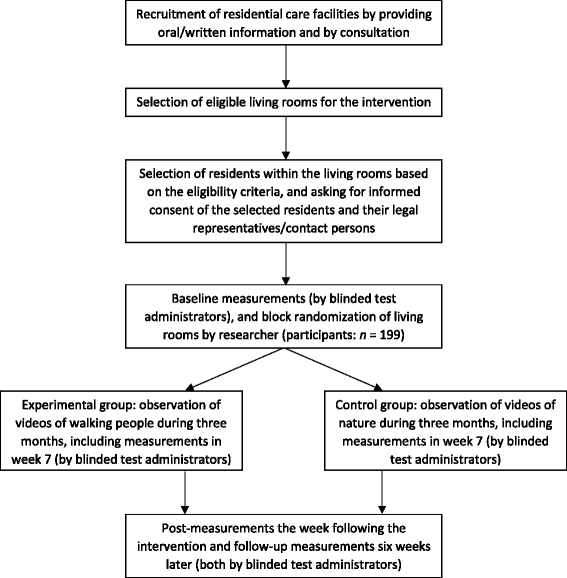The effects of observation of walking in a living room environment, on physical, cognitive, and quality of life related outcomes in older adults with dementia: a study protocol of a randomized controlled trial
- PMID: 25886987
- PMCID: PMC4407293
- DOI: 10.1186/s12877-015-0024-1
The effects of observation of walking in a living room environment, on physical, cognitive, and quality of life related outcomes in older adults with dementia: a study protocol of a randomized controlled trial
Abstract
Background: The number of older adults with dementia is expected to increase. Dementia is not only characterized by a decline in cognition, also other functions, for example, physical functioning change. A possible means to decrease the decline in these functions, or even improve them, could be increasing the amount of physical activity. A feasible way hereto may be activation of the mirror neuron system through action observation. This method has already been shown beneficial for the performance of actions in, for example, stroke patients. The primary aim of this study is to examine the effect of observing videos of walking people on physical activity and physical performance, in older adults with dementia. Secondary, effects on cognition and quality of life related factors will be examined.
Methods/design: A cluster randomized controlled trial is being performed, in which videos are shown to older adults with dementia (also additional eligibility criteria apply) in shared living rooms of residential care facilities. Due to the study design, living rooms instead of individual participants are randomly assigned to the experimental (videos of walking people) or control (videos of nature) condition, by means of drawing pieces of paper. The intervention has a duration of three months, and takes place on weekdays, during the day. There are four measurement occasions, in which physical activity, physical functioning, activities of daily living, cognition, the rest-activity rhythm, quality of life, and depression are assessed. Tests for participants are administered by a test administrator who is blind to the group the participant is in.
Discussion: This study examines the effect of the observation of walking people on multiple daily life functions and quality of life related factors in older adults with dementia. A strength of this study is that the intervention does not require much time and attention from caregivers or researchers. A challenge of the study is therefore to get to know for how long residents watch the videos. However, the design implies a high feasibility of the study, as well as a high applicability of the intervention into daily care.
Trial registration: NTR4708. Date of registration: 31 July 2014.
Figures
Similar articles
-
The effects of video observation of chewing during lunch on masticatory ability, food intake, cognition, activities of daily living, depression, and quality of life in older adults with dementia: a study protocol of an adjusted randomized controlled trial.BMC Geriatr. 2016 Feb 4;16:37. doi: 10.1186/s12877-016-0205-6. BMC Geriatr. 2016. PMID: 26846664 Free PMC article. Clinical Trial.
-
The effect of regular walks on various health aspects in older people with dementia: protocol of a randomized-controlled trial.BMC Geriatr. 2011 Aug 9;11:38. doi: 10.1186/1471-2318-11-38. BMC Geriatr. 2011. PMID: 21827648 Free PMC article. Clinical Trial.
-
Effectiveness of interventions to improve family-staff relationships in the care of people with dementia in residential aged care: a systematic review protocol.JBI Database System Rev Implement Rep. 2015 Nov;13(11):52-63. doi: 10.11124/jbisrir-2015-2415. JBI Database System Rev Implement Rep. 2015. PMID: 26657464
-
Remotely delivered information, training and support for informal caregivers of people with dementia.Cochrane Database Syst Rev. 2021 Jan 4;1(1):CD006440. doi: 10.1002/14651858.CD006440.pub3. Cochrane Database Syst Rev. 2021. PMID: 33417236 Free PMC article.
-
Effects of caregiver-provided individual cognitive interventions on cognition, social functioning and quality of life in older adults with major neurocognitive disorders: a systematic review.JBI Evid Synth. 2020 Apr;18(4):743-806. doi: 10.11124/JBISRIR-D-19-00125. JBI Evid Synth. 2020. PMID: 32813340
Cited by
-
The effects of video observation of chewing during lunch on masticatory ability, food intake, cognition, activities of daily living, depression, and quality of life in older adults with dementia: a study protocol of an adjusted randomized controlled trial.BMC Geriatr. 2016 Feb 4;16:37. doi: 10.1186/s12877-016-0205-6. BMC Geriatr. 2016. PMID: 26846664 Free PMC article. Clinical Trial.
-
Health, social care and technological interventions to improve functional ability of older adults living at home: An evidence and gap map.Campbell Syst Rev. 2021 Jul 7;17(3):e1175. doi: 10.1002/cl2.1175. eCollection 2021 Sep. Campbell Syst Rev. 2021. PMID: 37051456 Free PMC article.
References
-
- World population ageing: 1950–2050. [http://www.un.org/esa/population/publications/worldageing19502050/pdf/80...].
-
- World population ageing: 1950–2050. [http://www.un.org/esa/population/publications/worldageing19502050/pdf/90...].
-
- Dementia: a public health priority. [http://apps.who.int/iris/bitstream/10665/75263/1/9789241564458_eng.pdf]. - PubMed
Publication types
MeSH terms
Associated data
LinkOut - more resources
Full Text Sources
Other Literature Sources
Medical



